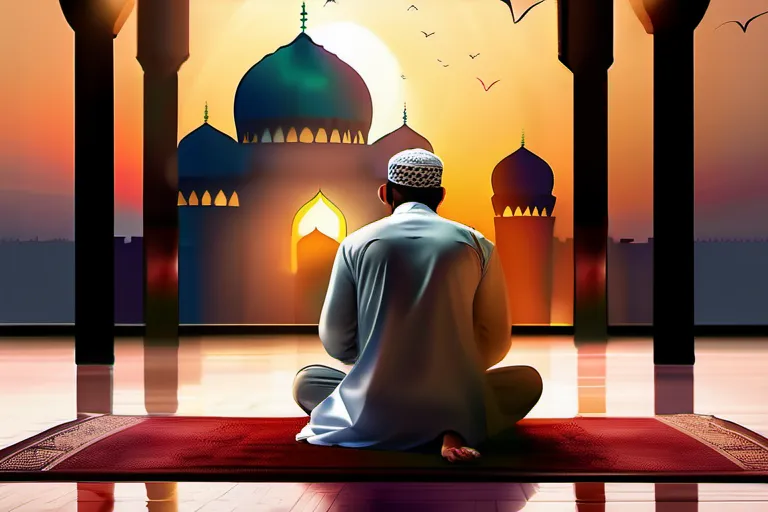Explore the importance, types, and benefits of prayer in Islamic faith.
Delve into the profound significance of prayer in Islam, a fundamental pillar of Muslim life. This article will provide an in-depth exploration of the various types of prayers, their importance, and the benefits they offer to followers of Islam.
The Five Pillars of Islam: An Overview
The Five Pillars of Islam: An Overview
Imagine a towering tree, its branches reaching towards the sky, providing shade and sustenance to all who seek shelter. Just as the roots of this tree hold it firmly in place, the Five Pillars of Islam form the core foundation of a Muslim’s faith and practice. These pillars serve as the essential components that strengthen one’s spiritual life and guide them on their journey towards Allah.
First among these is Shahada, or the declaration of faith, often referred to as the cornerstone. It encapsulates the belief in one God and the acceptance of Muhammad as His messenger. Can you imagine a building without its foundation? Just like that, without Shahada, Islam would lose its very essence.
The second pillar is Salah, which involves regular prayer five times a day. This daily ritual is akin to watering the tree; it keeps one’s spiritual roots nourished and ensures they remain close to God. But why stop at just watering? Salah also includes remembrance, reflection, and gratitude—a process that refines the soul and makes one more attuned to the divine.
Zakat is the third pillar, a form of almsgiving that purifies wealth. Think of it as a river that cleanses its banks; this act of giving back to those in need not only benefits others but also ensures the purity and integrity of one’s own heart.
The fourth pillar is Sawm, or fasting during Ramadan, a period of self-discipline and spiritual purification. Fasting can be seen as a temporary silence that allows us to hear the whispers of our soul more clearly, reminding us of our true purpose in life.
Finally, there is Hajj, the pilgrimage to Mecca, which every able-bodied Muslim should undertake at least once in their lifetime. This journey symbolizes unity and equality before God, offering a chance for each pilgrim to seek forgiveness and renewal.
Together, these Five Pillars stand as a testament to the holistic nature of Islam, encompassing not just spiritual growth but also social responsibility and physical devotion. They are the tools through which one can shape their life in accordance with divine guidance, ensuring that every action is imbued with meaning and purpose.
Salah: The Islamic Prayer
Imagine a tree, its branches reaching out to the sky, drawing life from the earth below. Just as this tree depends on nourishment from both above and below, Muslims see their daily prayers, Salah, as a vital connection between themselves and Allah. These prayers are not just religious obligations but a means of seeking closeness to the divine, much like how water is essential for a plant’s survival.
Why do we pray five times a day? It’s more than just fulfilling a ritual; it’s about maintaining a constant reminder and connection with Allah throughout our days. The Fajr, Dhuhr, Asr, Maghrib, and Isha prayers mark the divisions of the day, like milestones on a journey. Each prayer is a pause in our hurried existence, an opportunity to reflect and reconnect.
Think about it this way: every time we perform Salah, we are engaging in a dialogue with Allah. It’s as if each prayer session were a conversation, where we express our gratitude, seek guidance, and make requests. These moments of pause also offer a chance for introspection, allowing us to evaluate our actions and intentions. In essence, Salah becomes the heartbeat of our spiritual life, ensuring that we remain in touch with our faith and purpose.
The significance of Salah extends beyond personal devotion; it’s a communal act that unites Muslims across the globe. Imagine millions of people praying at the same time, their hands raised towards the heavens, united by the same act of worship. It’s a powerful symbol of unity and solidarity in the face of diversity.
The Importance of Salah in Muslim Life
The importance of Salah in Muslim life cannot be overstated. It serves as a constant reminder of our connection to Allah. Imagine prayer as a bridge that spans from your heart to His throne—how vital is it to maintain this connection amidst the chaos of daily life? Salah not only keeps us grounded but also guides us towards personal spiritual growth.
Every time we perform Salah, we reaffirm our commitment to our faith. It’s like planting a seed that eventually blossoms into a tree of righteousness and piety. Each prayer is a step on the path to self-improvement, helping us to align our will with His will. How can one ignore such an essential act of devotion?
Furthermore, Salah plays a significant role in purifying the soul. Just as water cleanses physical dirt, prayers cleanse the soul of sins and impurities. Can you imagine a day when your heart is spotless, free from all that hinders true worship? Wouldn’t that be a remarkable transformation?
It’s also worth noting how Salah can broaden our perspectives. Each posture in prayer—the standing, bowing, and prostration—mirrors different states of the soul. Through these postures, we learn humility, gratitude, and submission. How can someone not be humbled by the act of prostrating before Allah, acknowledging their smallness in His vast creation?
Moreover, Salah fosters community. When Muslims gather to pray together, they are reminded that they are part of a larger family, united under one God. This shared experience strengthens bonds and creates a sense of belonging. Is there any greater joy than knowing you’re not alone in your faith?
In conclusion, Salah is more than just an act of worship; it’s a powerful tool for spiritual development, purification, and community building. How can anyone overlook its significance in their lives?
The Benefits of Praying Regularly
Have you ever wondered how praying regularly can transform your life? The benefits of prayer in Islam extend far beyond mere spiritual sustenance; they are like a multi-faceted gemstone, sparkling with physical, mental, and spiritual light.
Physically, regular prayer serves as a form of meditation. Just as a candle burns brighter when trimmed, our bodies become more resilient through the act of praying. It helps in reducing stress hormones like cortisol, leading to improved cardiovascular health and lower blood pressure. Could you imagine how much smoother your daily routine would be if these physical benefits were part of your everyday practice?
Mentally, prayer offers a sanctuary from the chaos of the world outside. Like a ship navigating through stormy seas, our minds find calm in the structured prayers that Allah has prescribed for us. It enhances focus and clarity, making it easier to manage stress and maintain mental health. Have you ever felt the clarity after a session of prayer? It’s as if the clouds have parted, revealing a brighter sky.
On a spiritual level, regular worship is like planting a seed in rich soil; over time, it grows into a lush garden that reflects your devotion to Allah. Through consistent prayers, one can experience deeper levels of awareness and closeness to the Divine. It fosters humility, gratitude, and a sense of purpose. Can you imagine how fulfilling life would be if every day brought with it this spiritual nourishment?
In summary, regular prayer is not just about performing religious duties; it’s an essential practice that enriches all aspects of our lives. So, why wait? Start your journey today towards a more balanced and spiritually rich existence by embracing the blessings of Salah.
Special Occasions and Prayers in Islam
Imagine standing at the gates of Eid al-Fitr, the joyous celebration marking the end of Ramadan, the month of fasting. How can such a moment be complete without reciting the Takbirat al-Eid, declaring the greatness of Allah? This act is more than just a ritual; it’s a profound expression of thanksgiving and spiritual elevation. Just as dawn breaks to dispel darkness, the Eid prayers bring light and joy into lives that have been tempered by fasting and reflection.
Similarly, consider the solemnity of Eid al-Adha, the Festival of Sacrifice. Here, the act of slaughtering an animal in memory of Prophet Ibrahim’s willingness to obey Allah’s command takes on a deeper significance. The Du`a‘ of Eid, recited after the prayer, is a plea for forgiveness and blessings. It serves as a reminder that our trials can test our faith but also strengthen it.
These special occasions and prayers are more than just religious duties; they are moments where the community comes together in Iqaamat al-Salah, or calling to prayer, creating an atmosphere of unity and solidarity. Each recitation is a call not only for individual spiritual renewal but also for communal bonds that transcend personal differences.
As we step into these special prayers, let us reflect on their deeper meanings. Are they simply formalities, or do they hold the power to transform our spirits? The Eid prayers and other special occasions in Islam are not just about celebrating; they are a reaffirmation of faith, a reminder of our place in Allah’s grand design.
In essence, these prayers during special occasions are like bridges that connect us to the divine, fostering a sense of belonging and purpose. They remind us that our actions, no matter how small or large, have a profound impact on our spiritual journey and our community’s well-being. So, as you prepare for these days, ask yourself: How can I make this day count in ways that will last beyond the festivities?
The Impact of Prayer on the Islamic Community
Imagine standing side by side, shoulder to shoulder, in rows stretching as far as the eye can see – this vivid imagery encapsulates the profound unity that prayer brings into the Islamic community. Prayer is not merely a solitary act; it’s an interconnected dance where every step resonates with communal harmony.
Consider the call to prayer, the adhan, which acts like a heartbeat uniting millions across the globe in a synchronized chant. This ritual is more than just vocalization; it’s a symphony of devotion that transcends geographical boundaries and cultural divides. It’s as if every Muslim, regardless of their background or location, finds themselves part of a grand tapestry woven together by this common thread.
Through prayer, Muslims are reminded of the bukhara, the community of believers who stand united in their faith. This collective experience fosters a sense of brotherhood and unity that goes beyond mere physical proximity. In the heart of every mosque, from bustling Mecca to quiet villages, a universal message is transmitted – one that emphasizes shared values, compassion, and support for each other’s spiritual journey.
Moreover, prayer serves as a reminder of our interconnectedness with the divine and with fellow believers. Each prostration in Salah (the five daily prayers) is like bowing to acknowledge not only God but also your fellow worshipers. It’s this act of submission that bonds us together, symbolizing our shared struggle and aspiration for righteousness.
As we stand in rows during the Duhr prayer on a sweltering summer day or the Fajr during a quiet winter morning, we are not just fulfilling religious obligations; we are participating in a grand narrative of unity and faith. In this act, we find strength, support, and solace – reaffirming that our journey towards God is one that we undertake together.
Prayer thus becomes more than just a daily ritual; it’s the fabric that binds the Islamic community, weaving together threads of faith, love, and mutual respect. It’s through this regular practice that we find our place in the larger tapestry of humanity, united by our shared belief in Tawheed, the oneness of God.
Conclusion
 Understand the role of prayer in strengthening one’s faith and connection with Allah, as well as its impact on personal growth and spiritual development within the Islamic community.
Understand the role of prayer in strengthening one’s faith and connection with Allah, as well as its impact on personal growth and spiritual development within the Islamic community.











